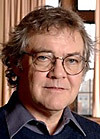 Here’s a point that somebody needed to spell out:
Here’s a point that somebody needed to spell out:
The Federal Communications Commission is considering whether to reduce restrictions on broadcast-station ownership, an action that would permit greater media and press concentration.There’s more. It’s all good. And it’s by a law professor who has written a book on the subject, so he appears to have researched it. Continue readingThis is a bad idea. Bad for audiences, for citizens, and for democracy. Dispersed media ownership, ideally local ownership, serves democratic values, while conglomerate ownership and media mergers, which would be the result of reduced ownership restrictions, do the opposite.
Equality — one person one vote — provides the proper standard for the distribution of power and voice in a democracy. Maximum dispersal of media ownership can enable more people to identify a media entity as in some sense speaking for and to them.
Dispersed ownership also reduces the danger of inordinate, potentially demagogic power in the public sphere. As the FCC once recognized, many owners creates more independent decision makers who can devote journalistic resources to investigative reports. Finally, dispersal reduces — without eliminating — potential conflicts of interests between journalism and an owner’s economic interests.
In contrast, media mergers put papers and broadcasters into the hands of executives whose career advancement depends on maximizing profits. Mergers require owners to squeeze out more profits to pay off debt created by the high bid made to secure the purchase. As too many recent examples show, the most consistent method to reduce expenses is to fire journalists.
— Dispersed media ownership serves democratic values By C. Edwin Baker, Los Angeles Times, 10 September 2007